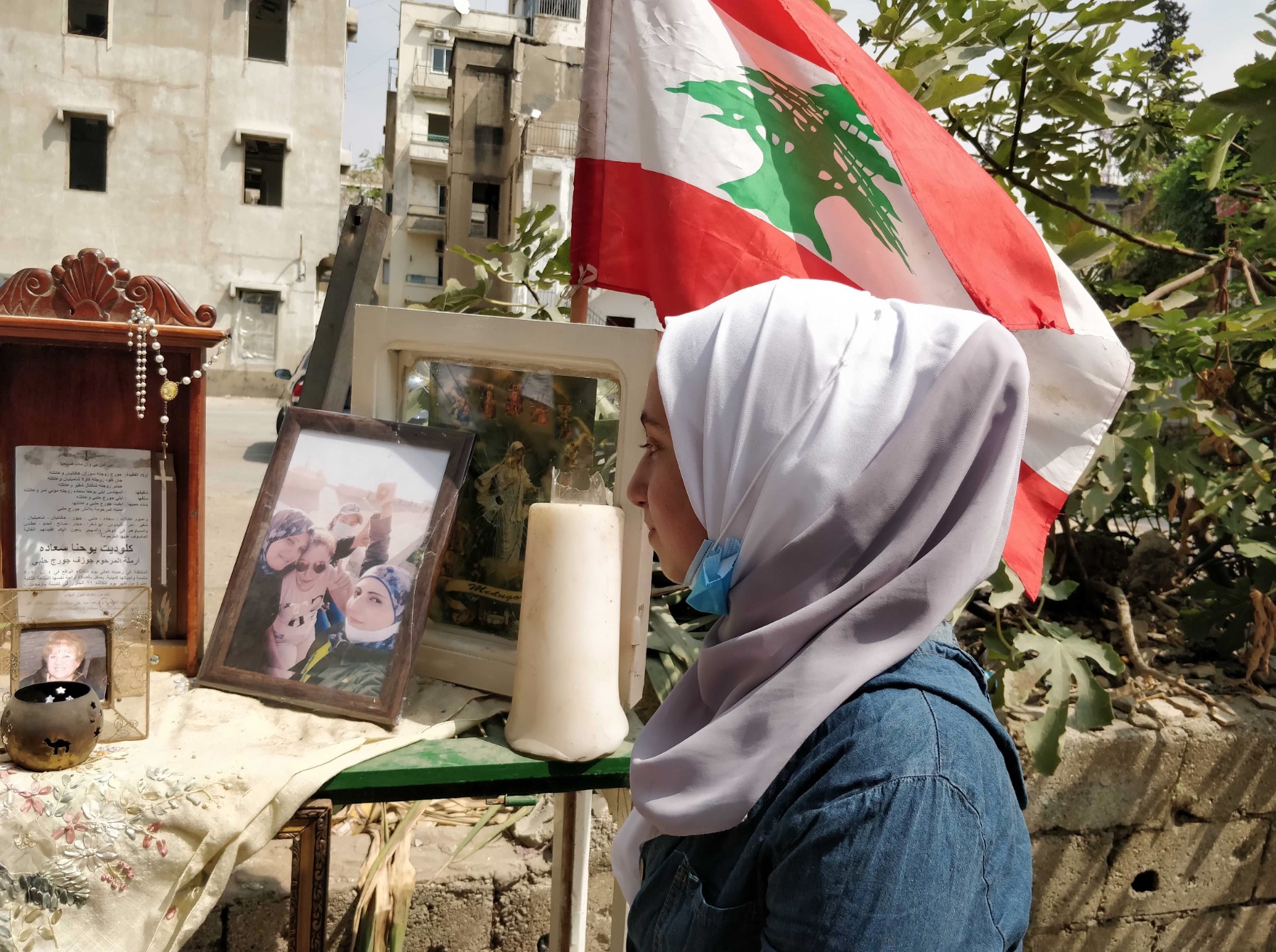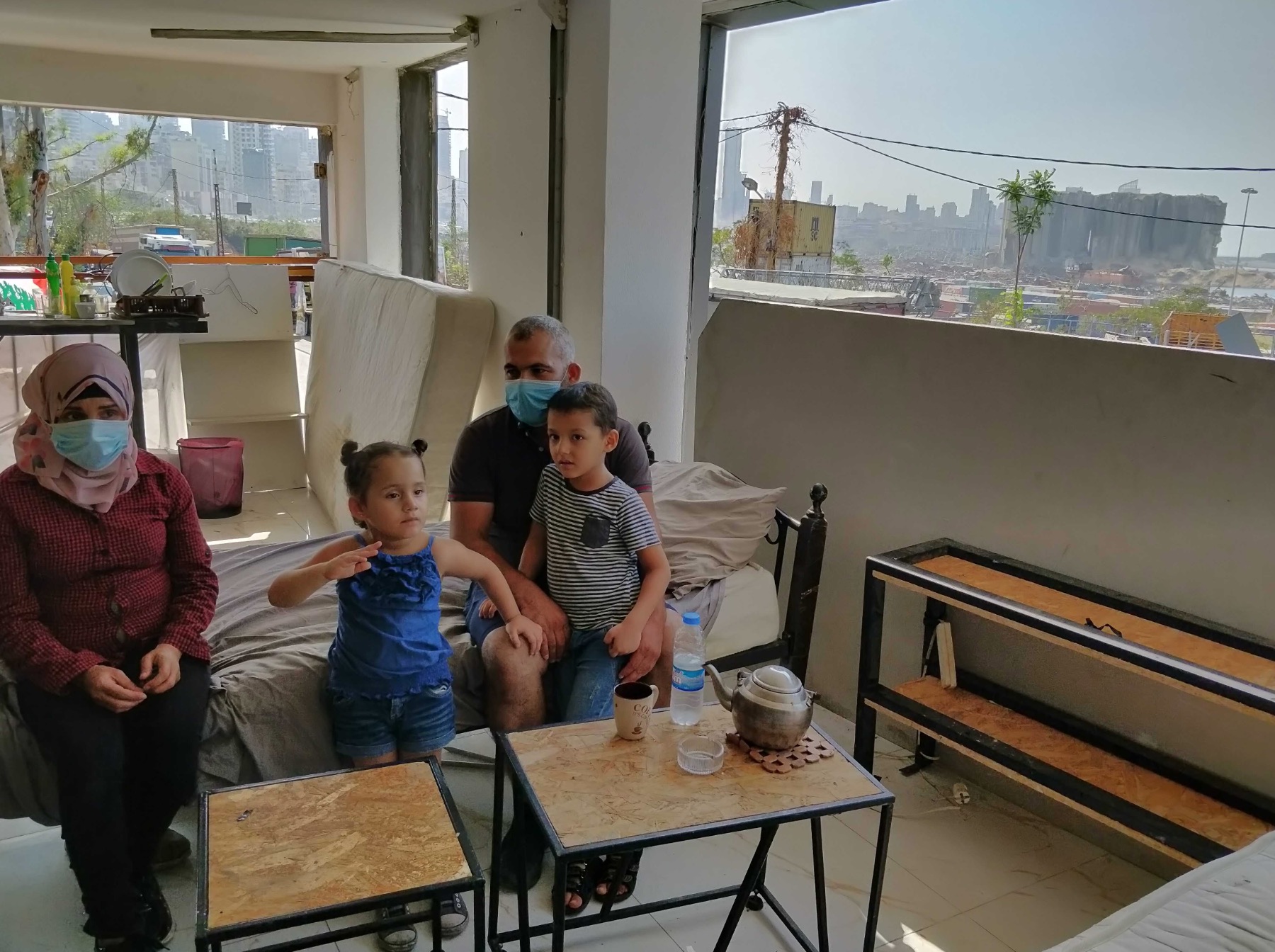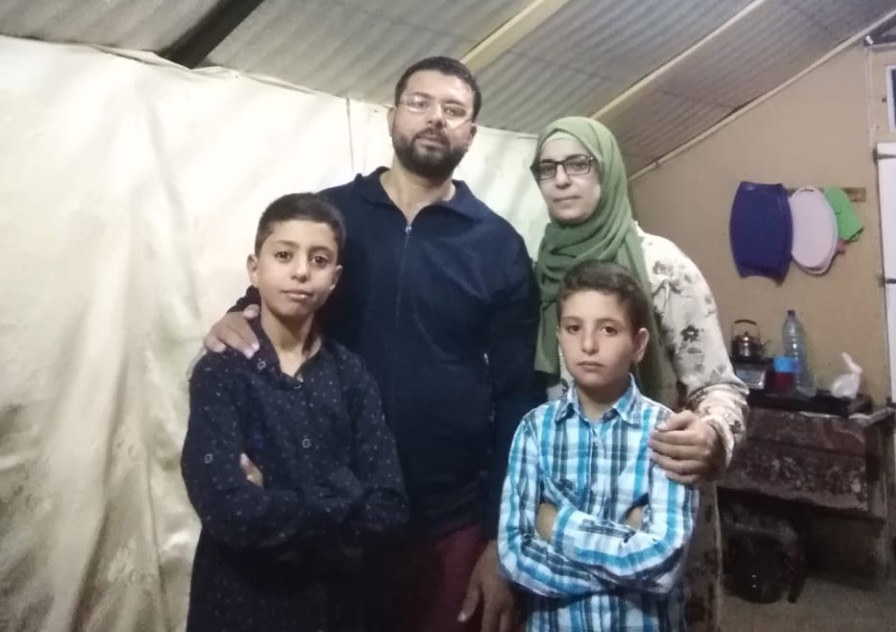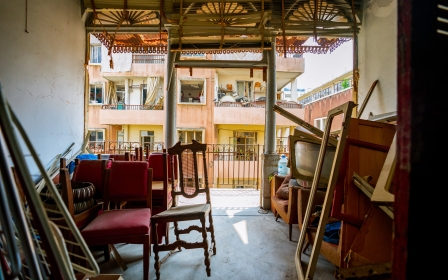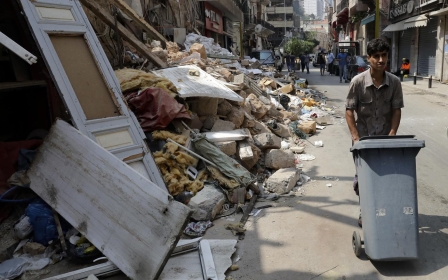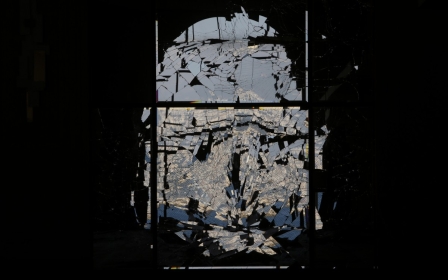Beirut explosion: Syrian refugees feel double the loss after port blast
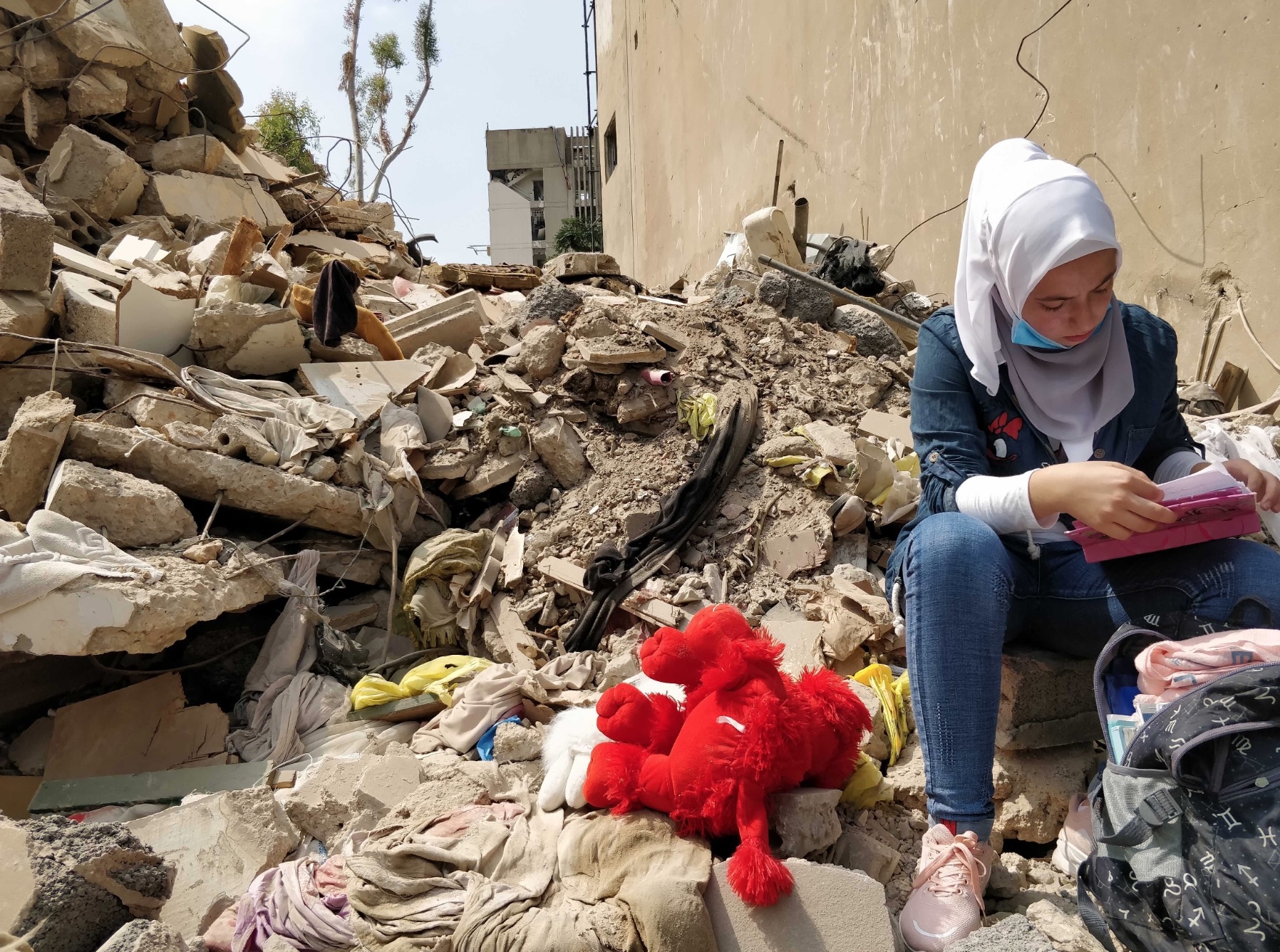
Nearly a month and a half after the explosion that devastated Beirut, Syrian refugees say they feel forgotten and abandoned as they struggle to recover in the aftermath of the blast and are left to rebuild their lives yet again in Lebanon.
On 4 August, some 2,750 tonnes of ammonium nitrate detonated in the Beirut port, killing nearly 200 people - including at least 43 Syrians - and wounding thousands. Entire neighbourhoods of the city were devastated by the blast, leaving an estimated 300,000 people homeless.
'I still can't believe they are gone. I try to shut my eyes tight and imagine my sisters and my mum. I hug them tight in my dreams and tell them everything is okay'
- Dima Hajj-Staifi, Syrian refugee in Beirut, aged 16
The World Bank says that the 4 August blast has caused up to $8.1bn in damage, worsening already dire economic conditions in the country.
Many Syrian families who fled the war raging in Syria since 2011 had moved to areas close to Beirut’s port, finding themselves near the epicentre of the biggest recorded non-nuclear explosion in history.
Dima Hajj-Staifi, 16, fled the northwestern province of Idlib with her family in 2014, after their home was destroyed by air strikes.
New MEE newsletter: Jerusalem Dispatch
Sign up to get the latest insights and analysis on Israel-Palestine, alongside Turkey Unpacked and other MEE newsletters
The family had started to rebuild their lives in Beirut’s Karantina neighbourhood area, where Dima’s father, Ahmed, started working in a detergent stall to earn a living.
“We had a nice, normal life in Syria. But when the war and air strikes started, we were living in constant fear and were forced to come to Lebanon," Ahmed told Middle East Eye.
"We thought we were finally happy and safe, and were ready to carry on with our lives. Then the explosion happened and everything was destroyed again.”
The family had decided to extend their celebration of the Muslim holiday of Eid Al-Adha and went to the beach on the morning of the blast. Dima’s mother had just finished cooking dinner for them to enjoy when the building collapsed on top of them, killing Dima's mother and two sisters, Latifa, 22, and Jude, 13.
Her older sister, Diana, 18, was rescued after being stuck under the rubble for 11 hours, and remains in hospital undergoing several operations to treat her wounds.
Ahmed’s detergent stall was destroyed leaving him unemployed - like many other Syrian refugees who saw their livelihoods destroyed in the blast.
Twice homeless
Hajj-Staifi is still struggling to process her loss over a month after the blast.
“I still can't believe they are gone. I try to shut my eyes tight and imagine my sisters and my mum. I hug them tight in my dreams and tell them everything is okay,” she recalled, crying.
Jihan Kaisi, the executive director of Lebanon-based NGO URDA, says that Syrian refugees are some of the worst off in the wake of the explosion, as they have been rendered homeless for a second time.
“After the blast, a lot of the media attention concentrated on the Lebanese lives that were lost, but Syrians have been badly affected by it too," she told MEE.
"Conditions for Syrians now are now much worse. They have lost their homes for a second time and are reliving the trauma. Many of them had good lives before their homes were destroyed in Syria, and now again in Lebanon.”
'Living in Syria was easier, because we knew there was a war, so we expected what was happening. But here, the unexpected happens'
- Mayaada Hussein, Syrian refugee
Some Syrian families are still living in their collapsed homes near the port, but say they are haunted by memories of the blast and regret moving to Lebanon.
Ahmed Othman and Mayaada Hussein live in their destroyed apartment directly facing the port. The family left Syria in 2014 when their home was destroyed, in search for a better life.
Over a month after the blast, Hussein says that she has received no support from the government or aid organisations, despite being eight months pregnant and having two children to care for.
“Living in Syria was easier, because we knew there was a war, so we expected what was happening. But here, the unexpected happens," she said. "Lots of people come by to take our name and ask us questions, but no one has helped us.”
The family have been unable to recover from the blast, as their apartment on the second floor remains without walls or windows, and Othman has lost his only source of income.
“I can’t go to sleep at night. I’m always worried about my children and them falling off the side of the apartment because we have no walls. All we want is just a place where we have a roof over our heads and doors and windows,” continued Hussein.
Lebanon is home to between 1.5 and 2 million Syrian refugees, hundreds of thousands of whom live in tented settlements and refugee camps across the country.
Far from Beirut in Musa al-Hindi refugee camp in the Bekaa governorate, families say that they have also been abandoned due to the coronavirus.
Mohammed Ghati and his wife Um Jamil have 11 children and live in a single room tent, where they say Lebanon's crippling economic situation has made their life even harder.
“Ever since the coronavirus started, aid workers and organisations stopped coming to the camp and delivering aid. We haven’t had any food packages since last Ramadan," Um Jamil explained.
"I’ve been wearing the same dress for eight years and because of the cost of the dollar we can’t afford anything.”
Fear of winter
With a harsh winter approaching, many families are worried they will not be able to make it through without aid.
Helmi used to work as a wood carver and artist in Syria when his home got destroyed and was forced to bring his family to Lebanon.
Now in al-Abrar refugee camp in the Bekaa valley, the Helmi family says they wait for food parcels, the number of which has decreased significantly. When they do arrive, they have to sell them in order to pay off their debts from borrowing money to buy food.
As schools are suspended due to the coronavirus, Helmi is unable to continue his work as a school bus driver, leaving the family struggling to pay rent for their tent and afford everyday essentials, such as winter clothes and food.
Last year, a wave of heavy snow and rainfall left at least 66 refugee camps in Lebanon impacted by flooding and freezing temperatures.
Refugees now fear the coming winter will be even worse after the hardships of this past year.
“Before, we could rely on friends or family to help each other out during difficult times, but now, every family is struggling financially so there is no way to get help," Helmi said.
Middle East Eye delivers independent and unrivalled coverage and analysis of the Middle East, North Africa and beyond. To learn more about republishing this content and the associated fees, please fill out this form. More about MEE can be found here.


